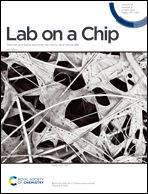Designing and prototyping a novel biosensor based on a volumetric bar-chart chip for urea detection
Abstract
A volumetric bar-chart chip (V-chip) is a microfluidic device based on distance-based quantitative measurement that visualizes analyte concentration without the need for apparatus or data processing. This typically utilizes special receptors and catalysis parts that generate oxygen, so ink can be moved inside the channels, and enables instant visual quantitation of the analyte. However, the low stability of some macromolecules, the use of expensive catalysts, and difficulty in controlling the process cause inaccurate readings, and therefore, limit further development and the use of these systems. In this article, we introduced a novel approach that eliminates the use of catalysts in V-chips and provides an efficient and simple path in the design of biosensors. The product of the enzymatic reaction of urease with urea is bicarbonate, which turns into CO2 gas in an acidic environment. Therefore, the amount of gas produced is proportional to the amount of urea in the sample, and it can be quantitatively measured by visual detection from the amount of ink movement caused by CO2 gas pressure. This biosensor has a linear response range of 0 to 1000 μg ml−1 and a detection limit of 3.6 μg ml−1 in raw milk. The recovery of urea in raw milk at 100 and 400 μg ml−1 concentrations was 96.5% and 98.9%, respectively. This volumetric chip shows potential for determining urea levels in real samples without requiring additional equipment. The combination of the sensitivity and specificity of enzymatic reactions, inherent gas-generating reactions, and the processability of microchips discussed in this paper can be the basis for the comprehensive development of volumetric chips, which can create a new path for the development of efficient and cheap biosensors.



 Please wait while we load your content...
Please wait while we load your content...